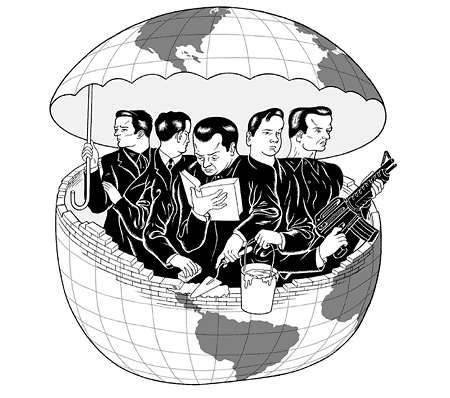By Scott Lanman and Steve Matthews
Oct. 23 (Bloomberg) -- Former Federal Reserve Chairman Alan Greenspan said a ``once-in-a-century credit tsunami'' has engulfed financial markets and conceded that his free-market ideology shunning regulation was flawed.
``Yes, I found a flaw,'' Greenspan said in response to grilling from the House Committee on Oversight and Government Reform. ``That is precisely the reason I was shocked because I'd been going for 40 years or more with very considerable evidence that it was working exceptionally well.''
Greenspan said he was ``partially'' wrong in opposing regulation of derivatives and acknowledged that financial institutions didn't protect shareholders and investments as well as he expected.
``We cannot expect perfection in any area where forecasting is required,'' he said. ``We have to do our best but not expect infallibility or omniscience.''
Part of the problem was that the Fed's ability to forecast the economy's trajectory is an inexact science, he said.
``If we are right 60 percent of the time in forecasting, we are doing exceptionally well; that means we are wrong 40 percent of the time,'' Greenspan said. ``Forecasting never gets to the point where it is 100 percent accurate.''
Self-Policing
The admission that free markets have their faults was a shift for the former Fed chairman who declared in a May 2005 speech that ``private regulation generally has proved far better at constraining excessive risk-taking than has government regulation.''
Today Committee Chairman Henry Waxman, a California Democrat, said Greenspan had ``the authority to prevent irresponsible lending practices that led to the subprime mortgage crisis.''
``You were advised to do so by many others,'' he told Greenspan. ``And now our whole economy is paying the price.''
Waxman and other lawmakers repeatedly interrupted Greenspan as he answered their questions, in contrast to deference to his testimony while he was Fed chairman.
Firms that bundle loans into securities for sale should be required to keep part of those securities, Greenspan said in prepared testimony. Other rules should address fraud and settlement of trades, he said.
Resistant to Regulation
Greenspan opposed increasing financial supervision as Fed chairman from August 1987 to January 2006. Policy makers are now struggling to contain a financial crisis marked by record foreclosures, falling asset prices and almost $660 billion in writedowns and losses tied to U.S. subprime mortgages.
Today, the former Fed chairman asked: ``What went wrong with global economic policies that had worked so effectively for nearly four decades?''
Greenspan reiterated his ``shocked disbelief'' that financial companies failed to execute sufficient ``surveillance'' on their trading counterparties to prevent surging losses. The ``breakdown'' was clearest in the market where securities firms packaged home mortgages into debt sold on to other investors, he said.
``As much as I would prefer it otherwise, in this financial environment I see no choice but to require that all securitizers retain a meaningful part of the securities they issue,'' Greenspan said. That would give the companies an incentive to ensure the assets are properly priced for their risk, advocates say.
Subprime Lending
Greenspan said the Fed didn't know the size of the subprime mortgage market until late 2005.
Securities and Exchange Commission Chairman Christopher Cox and former Treasury Secretary John Snow also appeared at the House committee hearing.
Snow said the economy is headed down a ``bad, bad path'' and he endorsed consideration of more fiscal stimulus. For the longer term, Snow said the global financial system should be reorganized by focusing on increasing transparency of ``excessive'' leverage to prevent institutions from creating too much risk.
The U.S. needs ``one strong national regulator'' to oversee firms and fix what Snow called ``a fragmented approach'' to regulation. ``Steps to restore transparency and responsibility in the marketplace will go a long way towards restoring stability and confidence,'' he said.
Addressing the trio that oversaw the U.S. financial markets as the housing bubble developed, Representative John Yarmuth, a Democrat from Kentucky, characterized them as ``three Bill Buckners,'' referring to the Boston Red Sox first baseman whose fielding error some fans blame for the team's loss in the 1986 World Series.
To contact the reporter on this story: Scott Lanman in Washington at slanman@bloomberg.net; Steve Matthews in Atlanta at smatthews@bloomberg.net.
Last Updated: October 23, 2008 14:14 EDT
Subscribe to:
Post Comments (Atom)
Rafael V. Mariano, chairperson of the Peasant Movement of the Philippines, 2000
Food has long been a political tool in US foreign policy. Twenty-five years ago USDA Secretary Earl Butz told the 1974 World Food Conference in Rome that food was a weapon, calling it 'one of the principal tools in our negotiating kit.' As far back as 1957 US Vice-President Hubert Humphrey told a US audience, "If you are looking for a way to get people to lean on you and to be dependent on you in terms of their cooperation with you, it seems to me that food dependence would be terrific."



No comments:
Post a Comment